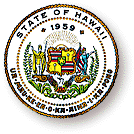State coffers
get a boost
A growing economy translates
to an extra $158 million for
the year ending June 30
The state's economy is expected to grow by 14.6 percent in the current fiscal year, according to a panel of economists.
Yesterday's forecast by the state Council on Revenues is 4.6 percentage points higher than the growth estimate predicted in March, when lawmakers began hammering out the final details of the two-year $8.95 billion state budget approved May 3.
 The increase means the state will have an estimated $158 million in additional revenue for the fiscal year that ends June 30, according to House financial analysts.
The increase means the state will have an estimated $158 million in additional revenue for the fiscal year that ends June 30, according to House financial analysts.
"We are very pleased with the latest projection from the Council on Revenues," House Speaker Calvin Say said in a statement. "This means that we will be able to fund more of the state's unmet needs. We still have many critical needs in education and health care that the Legislature was unable to fund."
The revised forecast is in line with general fund tax collections through the first 10 months of the fiscal year. The most recent figures from Tax Director Kurt Kawafuchi showed tax collections through the end of April totaling about $3.2 billion, a 14.6 increase over the same period a year ago.
Lawmakers and the governor use the council's quarterly forecasts in crafting the state's two-year budget.
Lingle said the forecast is good news for next year. "When the Legislature reconvenes in January 2006, our administration will again lead the effort to pass meaningful tax cuts to help ease the cost of living for our residents," she said.
Those measures will include increasing the standard deduction, providing a tax rebate on purchases of food, medical services and nonprescription medicine, offering tax credits for individuals who purchase long-term care insurance and other measures, such as Senate President Robert Bunda's proposal to cut taxes for the middle class, Lingle said.
Based on the previous council forecast, lawmakers shelved various proposals to provide tax relief to residents this year.
Majority Democrats called it a "responsible and prudent" budget that funds legislative priorities while also providing $296 million in pay raises awarded to public workers through binding arbitration and collective bargaining.
"Once again we receive a projection reaffirming that Hawaii's economy is booming," Senate Minority Leader Fred Hemmings said in a statement yesterday.
"Unfortunately, we have seen every available cent, and then some, consumed by collective-bargaining agreements through arbitration rather than a more balanced approach."
www.ehawaiigov.org
E-mail to City Desk
[News] [Business] [Features] [Sports] [Editorial] [Do It Electric!]
[Classified Ads] [Search] [Subscribe] [Info] [Letter to Editor]
[Feedback]
